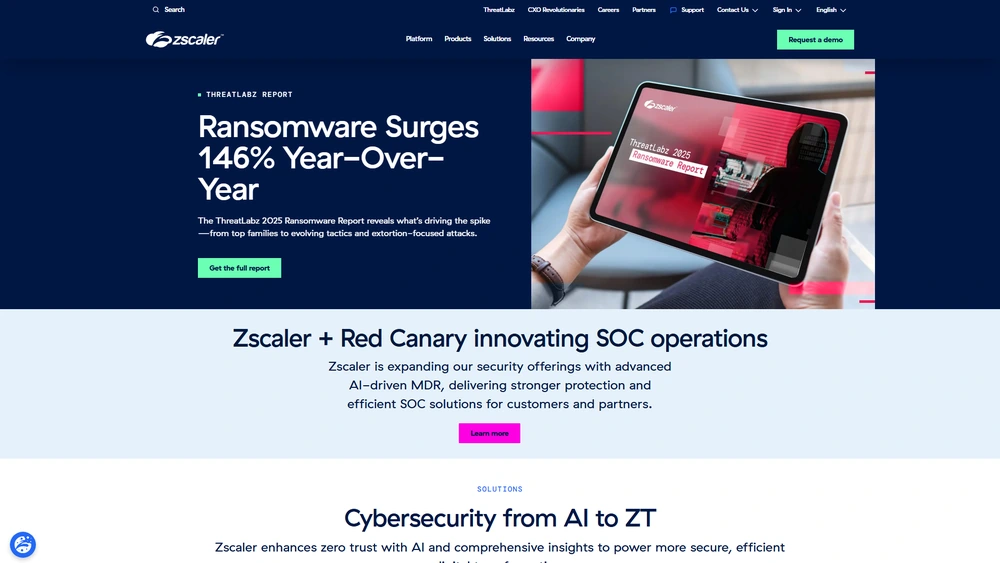Zscaler Overview & 2026 Industry Position
Founded on the vision of securing cloud-first businesses globally, Zscaler has grown into the definitive leader in cloud-delivered cybersecurity. Combining Zero Trust architecture, inline inspection, AI-driven threat detection, and scalable performance across distributed workforces, the company is transforming how enterprises protect access to users, devices, and applications. In 2026, Zscaler continues to dominate with a platform tailored for hybrid realities — securing AI workloads, remote operations, and compliance-heavy environments at scale.
From Launch to 2026: Zscaler’s Journey
Zscaler was founded in 2007 by Jay Chaudhry, who envisioned a future where web traffic needed to be secured without relying on traditional appliance-based solutions. Its early pivot to cloud-native architecture made it a disrupter in the network security space. By 2018, it became one of the first Zero Trust solutions publicly listed (NASDAQ: ZS).
- 2007: Company founded with a SaaS-based security model.
- 2012: Launch of Zscaler Internet Access (ZIA) and Zscaler Private Access (ZPA).
- 2018: IPO on NASDAQ.
- 2020: Surge in demand during pandemic-driven remote work transition.
- 2023: Acquisition of Canonic and Trustdome to extend CNAPP and identity governance capabilities.
- 2025: Expands AI-enabled policy engines, load-aware cloud firewalling, and industry-specific Zero Trust templates.
2026 Strategy Thesis: Zscaler is doubling down on inline Zero Trust Defense with federated AI, aiming to deliver universal policy orchestration across identities, endpoints, and workloads in real time.

Zscaler Key Features
The Zscaler platform offers tightly integrated modules, focused on three core areas: secure user access, secure app-to-app communication, and threat detection and prevention. Key product lines include:
- ZIA (Zscaler Internet Access): Enforces security policies across all user web traffic with SSL inspection, DLP, sandboxing, and cloud firewall.
- ZPA (Zscaler Private Access): Provides agent-based application-centric access to internal apps — without network-level exposure.
- ZDX (Zscaler Digital Experience): Performance monitoring and user experience optimization with real-time telemetry.
- Zscaler CNAPP: Post-2023 integrations of Trustdome and Canonic offer CIEM, workload posture control, and identity governance for containerized workloads.
- AI Policy Engine: New for 2026, adaptive policy governance with natural-language modeling for compliance auditing and enforcement.
Workflow & UX
Zscaler impresses with a streamlined admin UI that masks complex routing and policy logic behind friendly visual layouts. Key UX highlights:
- Centralized portal with real-time analytics and integrated alerts
- Visual policy builder with preloaded templates
- Granular role-based access management
- Drag-and-drop microsegmentation maps for application topology
For end users, a lightweight agent or browser plugin handles connectivity invisibly, optimizing latency through Zscaler’s 150+ global edge locations.
Zscaler Pricing Analysis & Value Metrics
Pricing remains quote-based at the enterprise level, but July 2026 package ranges are:
| Plan | Monthly/User | Included |
|---|---|---|
| ZIA Essential | $6–$9 | Basic firewall, TLS inspection, policy control |
| ZIA Business | $12–$16 | DLP, sandboxing, CASB, DNS security |
| ZPA | $8–$12 | Private app access, posture checks, rapid onboarding |
| ZDX | $4–$6 | Device/app performance insights |
| CNAPP Suite | Tiered | Workload hardening, CIEM, workload identity |
Value Summary: Zscaler offers high cost-per-security-return for organizations with 100+ headcount or hybrid infrastructure. Less optimal for very small businesses.
Competitive Landscape
Zscaler competes most notably with:
| Provider | Strengths | Ideal For |
|---|---|---|
| Palo Alto Prisma | Deep firewall/NGFW extensions | Large orgs with on-prem firewalls |
| Cloudflare Zero Trust | Latency, freemium model | SaaS-first SMBs |
| Perimeter 81 | Fast setup, intuitive UX | Mid-size remote teams |
| Zscaler | Policy enforcement, scale, cloud-native | Hybrid enterprise, compliance-heavy ops |
Use Cases
- Healthcare: HIPAA-friendly app access and encrypted telemetry paths.
- Financial Services: Inline DLP and custom logging for FINRA & PCI compliance.
- Global Enterprises: Performance edge routing across 150+ PoPs.
- DevOps-centric companies: Workload segmentation and lateral movement prevention.
Integrations
Zscaler integrates with a wide range of ecosystem tools for authentication, identity management, and observability:
- SSO & Identity: Okta, Ping Identity, Azure AD, Google Workspace
- SIEM & Logging: Splunk, Datadog, LogRhythm
- Endpoints: CrowdStrike, SentinelOne, Microsoft Defender
- Cloud platforms: AWS, Azure, GCP (CIEM connectors, workload policies)
Pros & Cons
- Pros: Proven scalability; policy-based controls; strong integrations; Zero Trust maturity.
- Cons: Pricing less suitable for small businesses; steeper learning curve for new admins.
Pro Tip: Evaluate Zscaler’s industry-specific policy templates — they’re optimized for verticals like healthcare and finance to accelerate deployment & compliance alignment.
Final Thoughts
For hybrid enterprises and distributed operations, Zscaler remains the gold standard in inline cloud security. Its holistic approach to user, workload, and network identity presents a unified Zero Trust architecture few can rival. While less ideal for startups with minimal cybersecurity pressure, Zscaler’s offerings scale beautifully for mid to large organizations navigating complex digital transformation or regulatory demands.
Zscaler FAQ
Zscaler secures internet access and private applications using a cloud-native Zero Trust platform for enterprises.
No. Zscaler is not a traditional antivirus — it’s a cloud-native platform that includes firewalls, DLP, SSL inspection, and policy-based access controls.
Zscaler offers compliance-ready templates and auditing tools tailored to HIPAA, PCI-DSS, FISMA, and GDPR.
Yes. Zscaler scales via its 150+ global edge network to deliver secure performance for remote users anywhere.
Deployment can take from days to a few weeks depending on organization size and complexity. Prebuilt policies expedite rollout.

